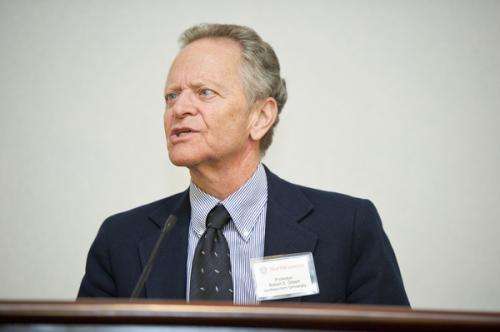3Qs: Town hall added drama to high-stakes debate

After a lackluster performance by President Obama in the first of the election season's three presidential debates, national polls showed an uptick in support for Republican challenger Mitt Romney. But much of the nation was looking to see how President Obama would respond in his second debate on Tuesday night. Northeastern University news office asked Robert E. Gilbert, the Edward W. Brooke Professor of Political Science, to analyze the town hall-style debate, in which both candidates aggressively made their case to the American voting public.
How did the town-hall format impact how both candidates interacted with one another and answered questions? Did this format lead to better answers?
I think the town-hall format of the debate contributed to its being one of the most dramatic and lively TV debates between presidential candidates in the 50 years we've had such encounters. In the past, each candidate has typically stood at a podium and responded to questions posed by a moderator. Last night, the moderator was assisted by ordinary citizens and, very significantly, the candidates walked around the stage freely.
At times, they "invaded" each other's space, making the event seem more free-flowing and contentious than in the past. I don't think this led to better answers on the issues, but it did heighten the impression that a real battle was being waged on the stage by two hostile candidates.
After Obama's poor performance in the first debate, political analysts and pundits argued that he needed to shine in Tuesday night's debate in order to stay competitive in the race. Did he live up to expectations?
Before the first debate, Obama seemed to be pulling ahead in the presidential race as he began to gain ascendancy in swing states including Ohio, Florida and North Carolina. But Romney scored extraordinarily well in their first joint TV encounter while Obama seemed listless and distracted. This led the momentum of the campaign to shift noticeably in Romney's favor.
Last night I would think that Obama did what he had to do to stop his decline. From the first moment to the last, he was articulate, aggressive and outspoken, mentioning his concerns for the middle class at every opportunity. In my view and according to public opinion surveys that I've considered, round two went to the president, both as a campaign and morale boost.
What was each candidate's biggest strength in the debate? What was their biggest weakest?
Obama's biggest strength in last night's debate is that he exceeded expectations. He seemed comfortable on the stage and took the fight assertively to his Republican opponent. Romney's strength was that he was articulate and responded well to many of Obama's attacks.
With regard to the weakest moments for each candidate, I think Obama's came in response to the question about the recent violence in Libya. At the last moment, he seemed to misspeak, creating confusion as to what he had actually said.
The weakest aspect of Romney's performance is that he was on the defensive throughout much of the evening, being hard-pressed by the president to explain and defend several of his positions.
Provided by Northeastern University


















